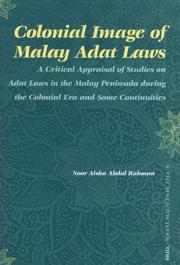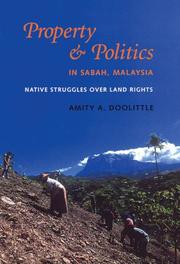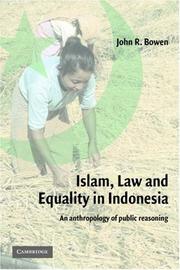| Listing 1 - 7 of 7 |
Sort by
|
Book
ISBN: 9004285695 9004286276 9789004286276 9789004285699 Year: 1947 Publisher: Brill
Abstract | Keywords | Export | Availability | Bookmark
 Loading...
Loading...Choose an application
- Reference Manager
- EndNote
- RefWorks (Direct export to RefWorks)
Indonesia
Adat law --- Civil law (Adat law) --- Customary law (Islamic law) --- Adat law. --- Indonesia --- indonesia

ISBN: 1281398586 9786611398583 9047409256 9789047409250 9004150560 9789004150560 9781281398581 9789004150560 9004150560 9789047409250 Year: 2006 Publisher: Leiden Boston Brill
Abstract | Keywords | Export | Availability | Bookmark
 Loading...
Loading...Choose an application
- Reference Manager
- EndNote
- RefWorks (Direct export to RefWorks)
This book is a study of conceptions of Malay adat laws by several prominent colonial writers and some continuities, whose works are generally acknowledged and long regarded as pioneering and authoritative expositions of the subject. Some of the central problems explored in this study are as follows: how are Malay adat laws understood and portrayed by the authors?, what are some of the problems raised and possible factors which influence their selection?, what are the unquestioned assumptions and sources which condition their perceptions?, to what extent can their ideas be considered as accurate portrayals of adat law and what implications do they have not only on the image of the laws but Malay society and culture generally. By addressing these problems, this book hopes to contribute to a more accurate and balanced understanding of Malay laws.
Adat law --- Islamic law --- Civil law (Islamic law) --- Law, Arab --- Law, Islamic --- Law in the Qurʼan --- Sharia (Islamic law) --- Shariʻah (Islamic law) --- Law, Oriental --- Law, Semitic --- Civil law (Adat law) --- Customary law (Islamic law) --- History. --- Islamic law.

ISBN: 0295801166 9780295801162 0295985399 9780295985398 9780295987620 0295987626 Year: 2005 Publisher: Seattle University of Washington Press
Abstract | Keywords | Export | Availability | Bookmark
 Loading...
Loading...Choose an application
- Reference Manager
- EndNote
- RefWorks (Direct export to RefWorks)
Customary law --- Land tenure --- Agrarian tenure --- Feudal tenure --- Freehold --- Land ownership --- Land question --- Landownership --- Tenure of land --- Land use, Rural --- Real property --- Land, Nationalization of --- Landowners --- Serfdom --- Customs (Law) --- Folk law --- Usage and custom (Law) --- Social norms --- Common law --- Time immemorial (Law) --- Law and legislation --- Adat law --- Civil law (Adat law) --- Customary law (Islamic law)
Book
ISBN: 9004286462 Year: 1958 Publisher: Brill
Abstract | Keywords | Export | Availability | Bookmark
 Loading...
Loading...Choose an application
- Reference Manager
- EndNote
- RefWorks (Direct export to RefWorks)
Indonesia
Law - Non-U.S. --- Law, Politics & Government --- Law - Africa, Asia, Pacific & Antarctica --- Adat law --- Adat law. --- Indonesia --- Civil law (Adat law) --- Customary law (Islamic law) --- Aceh (Indonesia) --- History --- Acheh (Indonesia) --- Achin (Indonesia) --- Atchin (Indonesia) --- Atjeh (Indonesia) --- Atsjin (Indonesia) --- D. I. Aceh (Indonesia) --- Daerah Istimewa Aceh (Indonesia) --- Daerah Istimewa Atjeh (Indonesia) --- Provinsi Aceh (Indonesia) --- Propinsi Atjeh (Indonesia) --- Pemerintah Aceh (Indonesia) --- Nanggroe Aceh Darussalam (Indonesia) --- Pemerintah Provinsi Aceh (Indonesia) --- indonesia --- Aceh --- Acehnese people --- Adat --- Christiaan Snouck Hurgronje --- Gujarat --- Minute and second of arc --- Mosque --- Penang --- Sultan

ISBN: 0521824826 9780521824828 0521531896 9780521531894 9780511615122 1107137489 0511179189 0511062370 0511056044 0511306237 0511615124 1280436743 1139149067 0511070837 9780511062377 9780511070839 9780511179181 9780511306235 Year: 2006 Publisher: Cambridge, UK ; New York, NY Cambridge University Press
Abstract | Keywords | Export | Availability | Bookmark
 Loading...
Loading...Choose an application
- Reference Manager
- EndNote
- RefWorks (Direct export to RefWorks)
In Indonesia, the world's largest Muslim-majority country, Muslims struggle to reconcile radically different sets of social norms and laws, including those derived from Islam, local social norms, and contemporary ideas about gender equality and rule of law. In this new study, John Bowen explores this struggle, through archival and ethnographic research in villages and courtrooms of the Aceh Province, Sumatra, and through interviews with national religious and legal figures. He analyses the social frameworks for disputes about land, inheritance, marriage, divorce, Islamic History and, more broadly, about the relationships between the state and Islam, and between Muslims and non-Muslims. The book speaks to debates carried out in all societies about how people can live together with their deep differences in values and ways of life. It will be welcomed by scholars and students across the social sciences, particularly those interested in anthropology, cultural sociology and political theory.
Legal polycentricity --- Islamic law --- Adat law --- Domestic relations --- #SBIB:39A75 --- #SBIB:39A10 --- #SBIB:316.331H330 --- Bijuralism --- Legal pluralism --- Pluralism, Legal --- Polycentric law --- Polycentricity, Legal --- Law --- Conflict of laws --- Families --- Family law --- Marriage --- Persons (Law) --- Sex and law --- Civil law (Adat law) --- Customary law (Islamic law) --- Etnografie: Azië --- Antropologie: religie, riten, magie, hekserij --- Godsdienst en politiek: algemeen --- Law and legislation --- Droit adat --- Case studies --- Case studies. --- Pluralisme juridique --- Droit islamique --- Social Sciences --- Anthropology --- Legal polycentricity - Indonesia --- Islamic law - Indonesia --- Adat law - Indonesia - Nanggroe Aceh Darussalam --- Domestic relations - Indonesia - Nanggroe Aceh Darussalam - Case studies
Book
ISBN: 9004285687 9004286268 9789004286269 9789004285682 Year: 1946 Publisher: Brill
Abstract | Keywords | Export | Availability | Bookmark
 Loading...
Loading...Choose an application
- Reference Manager
- EndNote
- RefWorks (Direct export to RefWorks)
Indonesia
Sundanese (Indonesian people) --- Adat law --- Social life and customs. --- Lesser Sunda Islands --- Civil law (Adat law) --- Customary law (Islamic law) --- Ethnology --- Lesser Soenda Islands --- Lesser Sunda Islands (Indonesia) --- Lesser Sundas --- Nusa Tenggara --- Soenda Islands, Lesser --- Sunda Islands, Lesser (Indonesia) --- Sunda Islands, Lesser --- Sundas, Lesser --- Malay Archipelago --- Parahyangan (Indonesian people) --- Priangan (Indonesian people) --- Sunda (Indonesian people) --- Urang Sunda (Indonesian people) --- Sundanese. --- indonesia --- Asia ; Lesser Sunda Islands. --- Manners and customs. --- Soundanais (Peuple d'Indonésie). --- Sundanese (Indonesian people). --- Asia --- Sonde, Petites îles de la --- Mœurs et coutumes.
Book
ISBN: 940172802X 9401728003 9789401728003 9789004287174 9004287175 9024721970 9789024721979 Year: 1979 Publisher: Brill
Abstract | Keywords | Export | Availability | Bookmark
 Loading...
Loading...Choose an application
- Reference Manager
- EndNote
- RefWorks (Direct export to RefWorks)
This book deals with the property and inheritance system of the matrilineal Minangkabau of West Sumatra in the context of legal pluralism. The author proposes a new anthropological approach to law, property and inheritance. After the description of the Minangkabau socio-political organization and the development of legal and administrative pluralism, three chapters are devoted to property and inheritance proper. First the ideal legal systems are described. Then he illustrates how the Minangkabau actually handle their property and inheritance affairs, and how the various regulating mechanisms have changed through history. Finally the different agents creating and changing legal conceptions are treated in historical perspective. In his conclusions the author shows how the traditional system of common holding and distributing of property by matrilineal descent groups is slowly being undermined through an increasing monetarization and consequent individualization of property relationships which finds its expression in the form of new legislation. This development is reflected in the conceptual system where the formerly predominant diachronic dimension of property relationships is slowly abolished and where property rights are increasingly reified.
Inheritance and succession --- Inheritance and succession (Adat law) --- Inheritance and succession (Islamic law) --- Minangkabau (Indonesian people) --- Indonesia --- Menangkabau (Indonesian people) --- Ethnology --- Islamic law --- Adat law --- Bequests --- Descent and distribution --- Descents --- Hereditary succession --- Intestacy --- Intestate succession --- Law of succession --- Succession, Intestate --- Real property --- Universal succession --- Trusts and trustees --- Law and legislation --- Endonèsie --- Indanezii︠a︡ --- Indoneshia --- Indoneshia Kyōwakoku --- Indonesië --- Indonesya --- Indonezia --- Indonezii︠a︡ --- Indonezija --- İndoneziya --- İndoneziya Respublikası --- Indūnīsīyā --- Induonezėjė --- Jumhūrīyah Indūnīsīyā --- PDRI (Pemerintah Darurat Republik Indonesia) --- Pemerintah Darurat Republik Indonesia --- R.I. (Republik Indonesia) --- Republic of Indonesia --- Republic of the United States of Indonesia --- Republica d'Indonesia --- Republiek van Indonesië --- Republik Indonesia --- Republik Indonesia Serikat --- Republika Indonezii︠a︡ --- Republika Indonezija --- Rėspublika Indanezii︠a︡ --- RI (Republik Indonesia) --- United States of Indonesia --- Yinni --- Рэспубліка Інданезія --- Република Индонезия --- Индонезия --- Інданезія --- إندونيسيا --- جمهورية إندونيسيا --- インドネシア --- インドネシア共和国 --- Dutch East Indies --- indonesia --- Adat --- Matrilineality --- Minangkabau people --- Netherlands --- Sharia
| Listing 1 - 7 of 7 |
Sort by
|

 Search
Search Feedback
Feedback About UniCat
About UniCat  Help
Help News
News